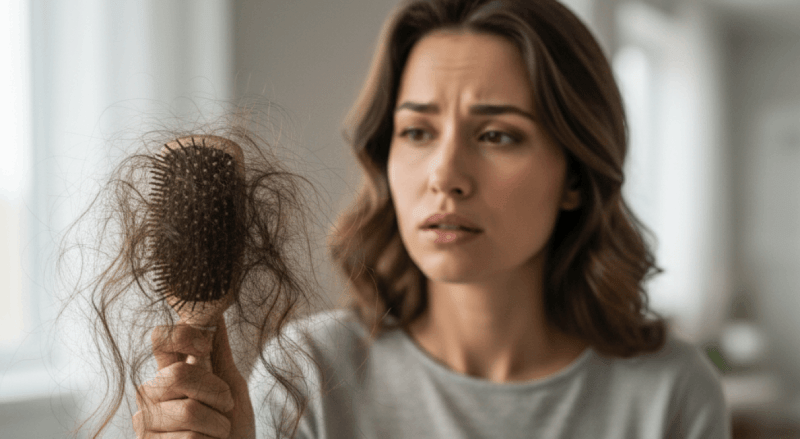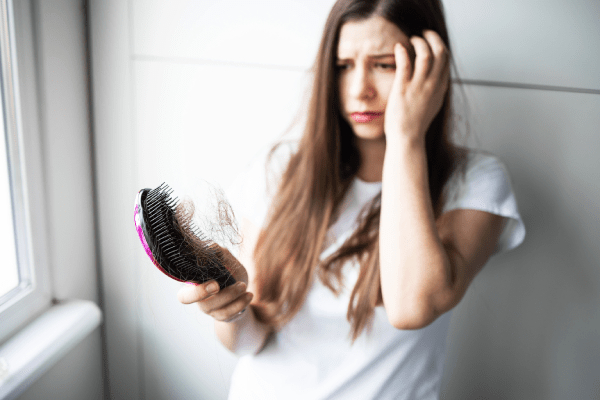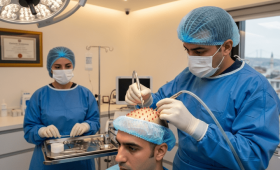Hair loss is a common problem that many people face, and it can be physically and psychologically distressing. Many factors such as genetic predisposition, hormonal changes, nutritional deficiencies, and stress can lead to hair loss. Although there are many chemical products on the market, it is possible to alleviate this problem and strengthen your hair with solutions offered by nature.
In this guide, we will detail 25 effective natural methods and lifestyle changes you can use to combat hair loss. Keep in mind that every individual’s hair structure is different, and the effects of these methods may vary from person to person. The important thing is to be patient and apply these methods regularly. However, we would like to point out that in cases of severe or sudden hair loss, you should consult a dermatologist.
1. Coconut Oil Massage
Coconut oil is one of the most beneficial natural products for hair health. The lauric acid in its content penetrates the hair strands deeply, preventing protein loss. It also moisturizes the scalp and accelerates blood circulation, which helps nourish the hair roots better.
How to Apply? Warm a small amount of pure coconut oil in your palm and gently massage your scalp with your fingertips for 10-15 minutes. The massage helps stimulate hair follicles by increasing blood flow. For best results, you can apply this process 2-3 times a week before bed and leave the oil on your hair overnight. Rinse with warm water in the morning.
2. The Miracle of Onion Juice
Onion juice is another powerful natural solution known to be effective in stopping hair loss. Onion is rich in sulfur, which carries oxygen to the hair roots. Sulfur helps in hair regrowth by increasing collagen production and strengthens hair follicles.
How to Apply? Grate an onion and squeeze its juice, or blend it. Apply the onion juice you get to your scalp with a cotton pad. The smell can be bothersome, so wash your hair with a mild shampoo after about 30-45 minutes. Regular use can provide visible results.
3. The Benefits of Aloe Vera Gel
Aloe vera works wonders not only for the skin but also for hair health. Thanks to the vitamins and enzymes in its content, it maintains the pH balance of the scalp, prevents dandruff, and soothes hair follicles. It also helps reduce inflammation on the scalp.
How to Apply? Extract the gel from a fresh aloe vera leaf or use organic aloe vera gel. Apply the gel directly to your scalp and hair. Rinse with warm water after 30 minutes. Repeating this 2-3 times a week will help reduce hair loss and make hair look more vibrant.
4. The Power of Castor Oil
Castor oil is a popular solution used against hair loss. The high amount of ricinoleic acid in its content increases blood circulation on the scalp and prevents the formation of bacteria and fungi. This acid also nourishes hair strands, preventing breakage and making hair look fuller.
How to Apply? Castor oil is very dense, so it is often recommended to mix it with a lighter carrier oil such as almond oil or olive oil. Massage the mixture into your scalp and wash your hair after about an hour.
5. The Effect of Rosemary Oil
Rosemary oil is a powerful essential oil that stimulates hair follicles and promotes hair growth. Studies have shown that rosemary oil can be as effective as common medications like minoxidil in preventing hair loss.
How to Apply? Mix a few drops of rosemary oil with a carrier oil like almond oil or coconut oil. Massage this mixture into your scalp. Its smell is quite pleasant and it helps strengthen your hair. It can be applied regularly several times a week.
6. The Power of Green Tea
Green tea is high in antioxidants and can help block the dihydrotestosterone (DHT) hormone that causes hair loss. This hormone is one of the main causes of male pattern baldness.
How to Apply? Brew two green tea bags in a cup of hot water. Once it cools down, apply this water to your hair and scalp. Rinse your hair after an hour. This method not only reduces hair loss but also helps cleanse the scalp.
7. The Use of Nettle
Nettle is rich in minerals important for hair health, such as iron, silica, and sulfur. It has been traditionally used to prevent hair loss and support hair regrowth.
How to Apply? Boil a handful of fresh or dried nettle in one liter of water. After it cools down, strain the water and use it as the final rinse water after washing your hair. Nettle strengthens hair roots and adds shine.
8. The Application of Potato Juice
Potato juice is a little-known method that is good for hair loss. The Vitamins B, C, and A in its content, as well as minerals such as iron, zinc, and niacin, nourish hair roots and promote hair growth.
How to Apply? Grate one or two potatoes and squeeze the juice. Massage this juice into your scalp. Wash your hair after 15-20 minutes.
9. Fenugreek Seeds
Fenugreek seeds are one of the oldest and most effective home remedies for hair loss. The protein and nicotinic acid in its content promote hair growth and help repair hair follicles.
How to Apply? Soak a handful of fenugreek seeds in a cup of water overnight. In the morning, mash the seeds to make a paste. Apply this paste to your scalp and wash it off after 30 minutes.
10. Vitamin B12 and Biotin Supplements
B vitamins are vital for healthy hair growth. Especially a deficiency of Biotin (B7) and Vitamin B12 can lead to hair loss. These vitamins play a role in the production of keratin, the main building block of hair.
How to Apply? You can consume foods rich in Biotin and B12 (eggs, almonds, walnuts, red meat) or take supplements after consulting your doctor. These supplements support your hair health from the inside.

11. Zinc and Iron Deficiency
Zinc and iron are essential for basic functions in the body, such as oxygen transport and cell division. A deficiency of these minerals can weaken hair follicles and lead to hair loss.
How to Apply? Add foods rich in zinc and iron (spinach, lentils, red meat, pumpkin seeds) to your diet. You can get a blood test to see if you have a deficiency and take supplements if necessary.
12. Vitamin E and Avocado
Vitamin E promotes hair growth by increasing blood circulation on the scalp and provides the necessary nutrients to the hair follicles. Avocado is a fruit rich in Vitamin E.
How to Apply? Mash an avocado and add a few drops of almond oil to prepare a hair mask. Apply this mask to your hair, and rinse it off after 20-30 minutes. This mask nourishes your hair and prevents breakage.
13. The Role of Omega-3 Fatty Acids
Omega-3 fatty acids are essential fats that make hair shiny and healthy. They nourish hair follicles and help reduce inflammation on the scalp.
How to Apply? Regularly consume foods rich in omega-3, such as salmon, walnuts, chia seeds, and flax seeds. These foods help protect your hair health from the inside.
14. Protein-Rich Diet
Hair is made up of approximately 95% of a protein called keratin. Insufficient protein intake can slow down hair growth and increase hair loss.
How to Apply? Add a sufficient amount of protein to your diet. Regularly consume protein sources such as red meat, chicken, fish, eggs, lentils, chickpeas, and yogurt.
15. Olive Oil and Honey Mixture
Olive oil is rich in antioxidants and nourishes the scalp. Honey is a natural moisturizer and strengthens hair roots. The mixture of these two creates an effective mask against hair loss.
How to Apply? Mix two tablespoons of olive oil with one tablespoon of honey. Apply this mixture to your scalp and hair. Rinse with warm water after 30 minutes.
16. Lemon and Ginger Juice
Lemon is rich in Vitamin C and helps restore the pH balance of the scalp. Ginger, on the other hand, accelerates blood circulation and stimulates hair roots.
How to Apply? Squeeze the juice of some ginger and add a few drops of lemon juice. Massage this mixture into your scalp. Wash your hair after about 15 minutes.
17. Black Tea and Coffee Rinse
Black tea and coffee, thanks to the caffeine they contain, stimulate hair follicles and support hair growth. Caffeine helps reduce the effect of the DHT hormone that causes hair loss.
How to Apply? Rinse your hair with brewed and cooled black tea or coffee. Rinse again after 15-20 minutes. This process also gives hair shine.
18. Staying Away from Stress
Stress is one of the most common causes of hair loss. High levels of stress trigger hormonal changes that cause hair follicles to enter the resting phase.
How to Apply? Incorporate activities such as meditation, yoga, deep breathing exercises, or regular exercise into your life to manage stress. Taking up hobbies and spending time with loved ones also helps reduce stress.
19. Sufficient and Quality Sleep
Sleep is a process in which the body repairs and renews itself. Not getting enough sleep increases stress levels and can lead to the secretion of hormones that negatively affect hair growth.
How to Apply? Aim to get 7-8 hours of quality sleep every night. Increase your sleep quality by keeping your bedroom dark, cool, and quiet.
20. Correct Shampoo and Hair Care
Some shampoos on the market may contain harsh chemicals and damage the scalp. To prevent hair loss, it is important to use natural, sulfate and paraben-free shampoos.
How to Apply? Prefer herbal shampoos for hair loss. Avoid washing your hair with hot water, use lukewarm water. Dry your hair gently and use heat-emitting tools like a hairdryer as little as possible.
21. Scalp Peeling
Dead skin cells, shampoo residue, and oil that accumulate on the scalp can clog hair follicles and prevent hair growth. Regular scalp peeling allows hair roots to breathe better.
How to Apply? Mix some sea salt or sugar with olive oil. Gently massage your scalp with this mixture to exfoliate. Rinse after 10 minutes.
22. Protection from the Sun’s Harmful Effects
UV rays can damage hair strands, weaken them, and make them more prone to breakage. Excessive sun exposure also negatively affects the health of the scalp.
How to Apply? Wear a hat or use UV-protective hair sprays when you will be in the sun for a long time. These simple precautions protect your hair from the sun’s harmful effects.
23. Drinking Plenty of Water
More than 70% of our body is made of water, and our hair can also be affected by dehydration. Insufficient water intake can cause hair strands to dry out, weaken, and fall out.
How to Apply? Make sure to drink at least 8-10 glasses of water daily. The body’s sufficient fluid intake keeps hair follicles moist and allows hair to grow healthily.
24. Apple Cider Vinegar Rinse
Apple cider vinegar helps restore the pH balance of the scalp and prevents the formation of fungus or bacteria. This contributes to the strengthening of hair roots and the reduction of hair loss.
How to Apply? Mix one tablespoon of apple cider vinegar with a glass of water. Rinse your hair with this mixture after shampooing. To get rid of the strong smell, do a final rinse with plain water after a few minutes.
25. Conclusion: The Importance of Patience and Consistency
Combating hair loss is a process that requires patience and consistency. Natural methods may not give instant results like chemically-based products. Therefore, it is important to apply the methods you choose regularly for at least a few months. It will take time for your scalp and hair to adapt to this new routine. Do not give up during this process, be kind to yourself, and continue to pay attention to your nutrition, stress management, and sleep schedule. If your hair loss continues, it is best to consult an expert as there may be an underlying medical reason.



